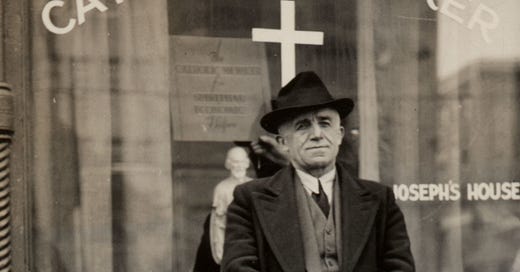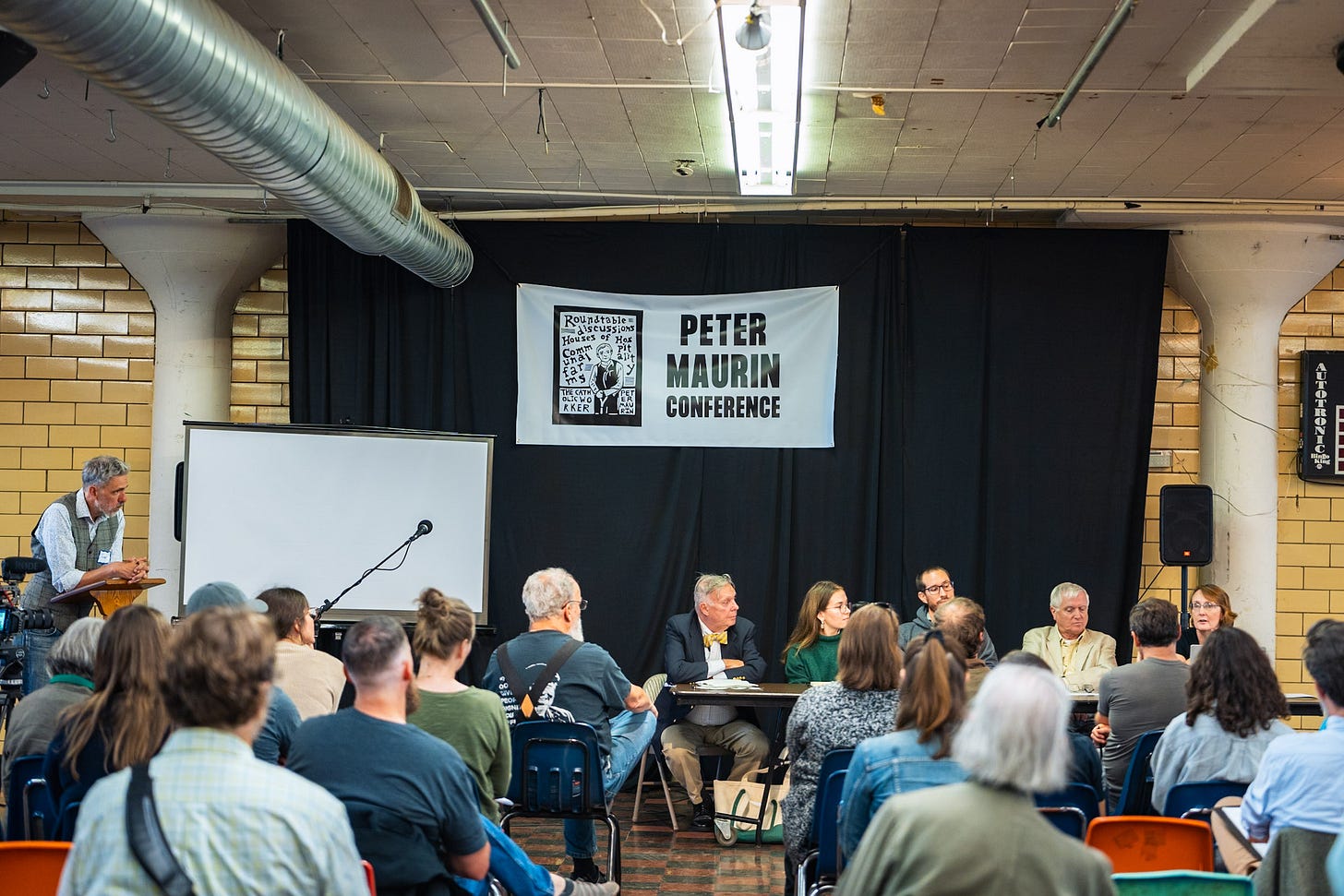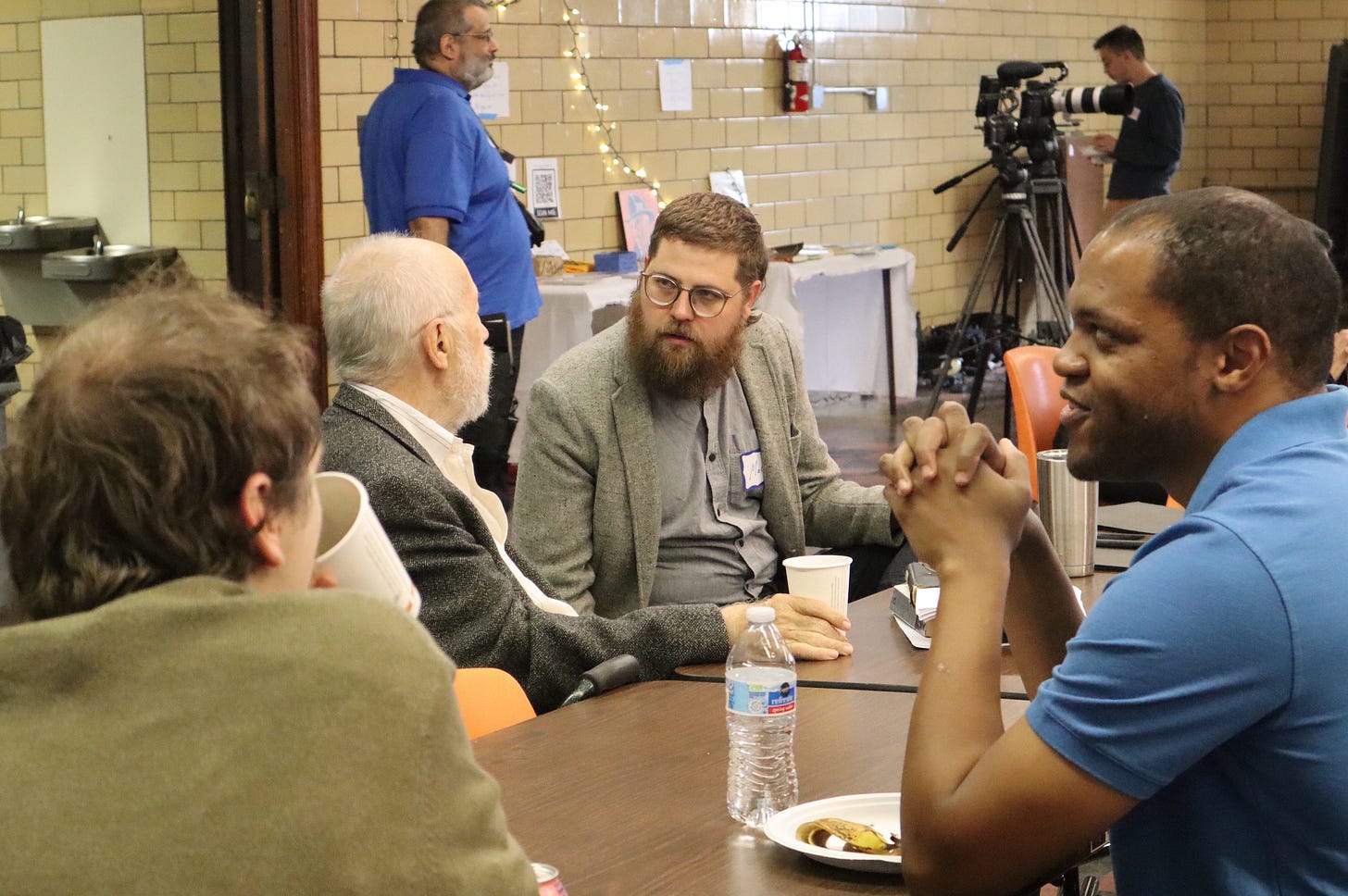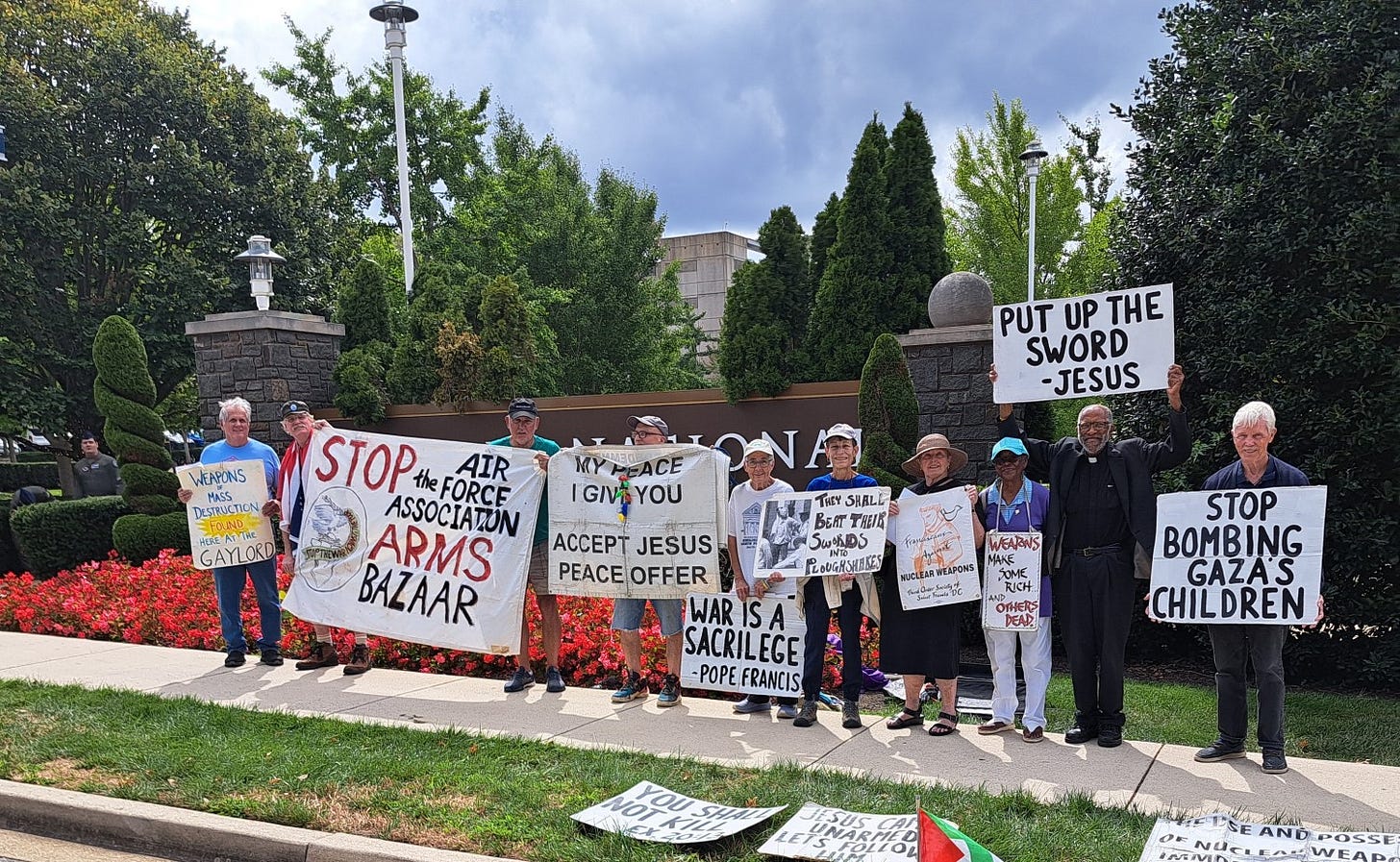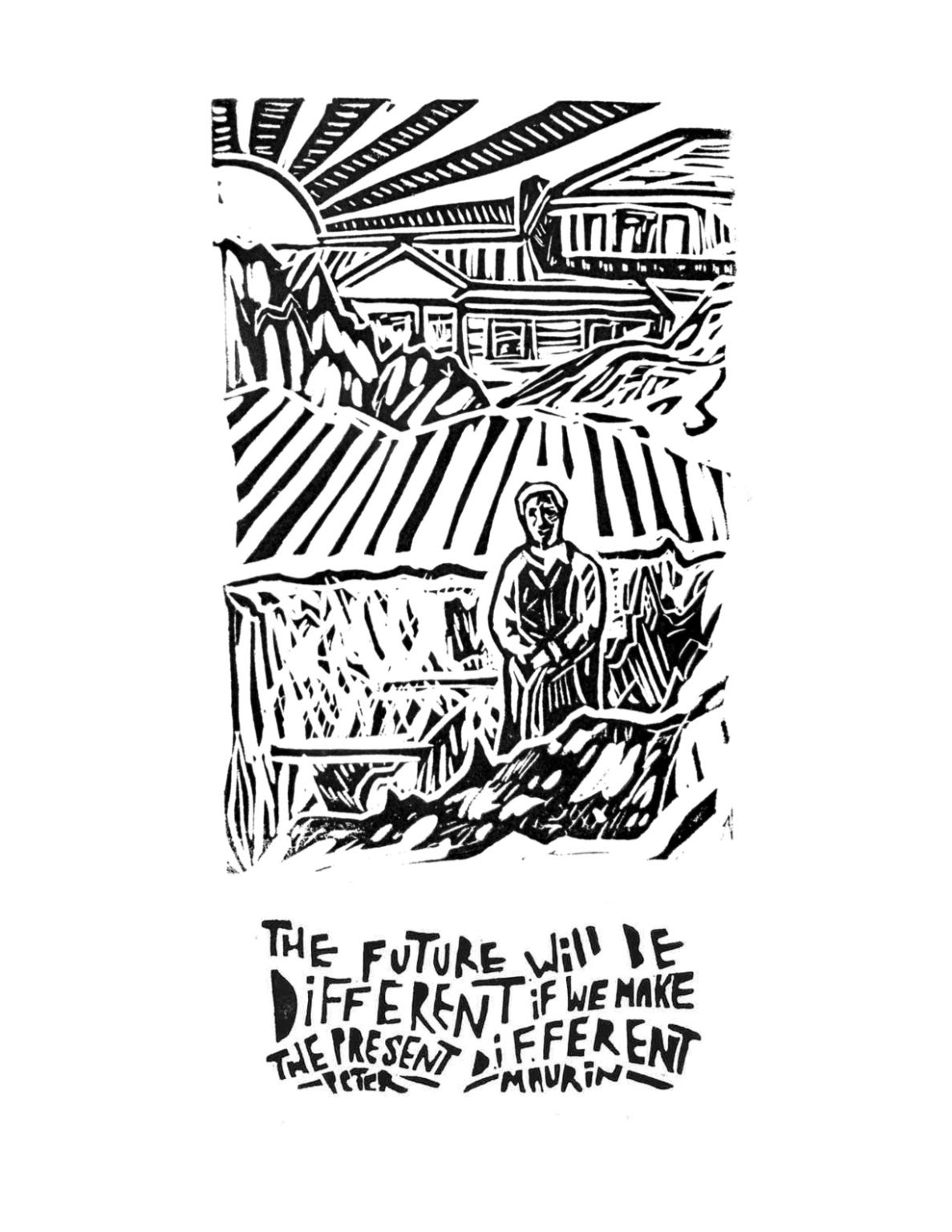Why We Need Peter Maurin Now More Than Ever
We recap the Peter Maurin Conference. Also: Working with immigrants at Casa Juan Diego; D.C. CWers protest arms bazaar; the power of shared meals; and what Steve from Blue's Clues has to teach us.
How are you?
I’d wager that I’ve watched more episodes of Blue’s Clues, the popular children’s show that ran from 1996 – 2006 on Nickelodeon, than most other Catholic Workers over the age of 30. It was my kids’ go-to show during nap time (mine, not theirs) during my stay-at-home parenting days. (Don’t worry, I was in the same room as them, half-asleep on the couch.)
I bring this up because of an article I read this week about how the original host, Steve Burns, has gone viral on TikTok for making short videos in which he sits down, looks into the camera, and asks, “How are you?” Then, he pretends to listen for about a minute. People respond in the comments, sharing their own state of mind and supporting one another. “I think that’s really beautiful,” Burns told his interviewer. “And it’s happening just because some middle-aged bald dude in glasses is paying attention.”
I wasn’t at the Winona Catholic Worker very long—a few days, a week or two, maybe—before it dawned on me that one of the most important things we were doing was simply listening. I remember being in the kitchen with a talkative guest who was pouring out her life story as I was kind of eyeing the clock, thinking about how I wanted to go to bed. I was weighing whether to tie off the conversation or just let her keep talking. Somewhere in there, it struck me that this work—listening to this woman tell her story—was maybe more important than anything else we were doing for her.
We do a lot of talking these days. (On YouTube alone, more than 30,000 hours of video are uploaded every hour.) Listening, not so much.
StoryCorps got it right with the title of their first book, Listening is an Act of Love. Listening as an act of love has two key movements. First, silencing ourselves—not only our mouths, but our minds, in order to make room for another person to be. Second, allowing the other person to make an impression on us by their words: to truly listen is to be changed by the other person. This kind of listening is an act of love because it generously affirms the value of the other person; it is the act of giving up a little bit of one’s self in order to receive the other.
“Blue’s Clues” is said to have “revolutionized” the genre by making space to “listen” to its audience. If the Catholic Worker is about a nonviolent revolution of the social order, then maybe the seed of that revolution is this healing work that happens so quietly, so out of sight, in so many houses of hospitality.
Given the intensity of this past week’s news—Israel widening its war in the Middle East, while attacks on immigrants reach new heights at home—let’s be sure to take time this week to ask someone that simple question: “How are you?”
Our reader survey
Speaking of listening, more than 60 of you have taken our 10-question reader survey. Let’s see whether we can push that number over 100 this week! Your answers to our questions help improve the conversation.
Corrections
In last week’s story about the Amistad Catholic Worker, we stated that the community had begun hosting people in their backyard in 2023. Mark Colville corrects the record: “It was in June of 2022 (not ‘23) that we first declared our backyard to be public land, and a human rights zone and started inviting people to set up tents there.”
And in last week’s story about the history of Sugar Creek, we stated that the Davenport Catholic Worker had “purchased” a plot of land at St. Joseph Church. That was never the case, says Betsy Keenan (Strangers and Guests Catholic Worker, Maloy, Iowa), who wrote to clarify that the Davenport Catholic Worker paid an annual rent for the use of the kitchen and some of the rooms in the retreat center.
Keenan also wanted to note the generous hospitality of the parishioners throughout the years: "There were some years where I was the liaison between (the church and the Catholic Worker), and of course in every parish group like that there is a range from the most cautious to the more open, experimental types. I think they have really given the movement a great gift and dealt with our large, unruly and unpredictable group most kindly!"
Continuing the conversation
Roundtable reader Kevin Cushing commented on last week’s issue: “I agreed with the pacifist approach of the CW until the Ukraine war. It’s easy to be a pacifist when you’re thousands of miles away on a quiet farm or even a busy house not threatened by bombs, drones, missiles or armies. Should the Ukrainian people just abandon their homes and businesses and flee, not fighting back? Should they just let the Russians grab their land and encourage Putin to invade Poland, Estonia, or any other neighboring country? No one but madmen like Putin wants war and I don’t like to see millions of dollars spent on military hardware like bombs, missiles and tanks but I see little choice.”
You can connect with Kevin on the issue’s comment thread.
FEATURED
‘We Need Peter Maurin’ More Than Ever
“Peter Maurin, co-founder of the Catholic Worker movement, seems more out of the picture in our everyday lives here,” a correspondent from Maryhouse in NYC wrote in The Catholic Worker in June 2017. “‘[Dorothy Day] is more, you could say, ‘in the news.’”
But Peter Maurin made some news in early September at the Peter Maurin Conference, September 6-8 in Chicago, held at St. Gregory’s Hall, part of Mary, Mother of God Parish. Mark Franzen, director of St. Gregory Hall, and James Murphy, director of Canterbury House—a house of hospitality at Mary Mother of God Parish—organized the conference, with assistance from Roundtable’s own Renée Roden.
The Peter Maurin Conference was held at a parish to represent Peter’s call to the Catholic Church to “blow the dynamite” of Catholic Social Teaching and to strive to incarnate Peter’s vision of houses of hospitality—where the worker can meet the scholar and the scholar the worker.
More than 100 attendees—from California to France—came to learn more about Peter Maurin and discuss his vision, his sources, and its practical application to the problems of the world today.
Mattie Jenkins came to Chicago from Wichita, Kansas, where she is a founding member of the brand-new Romero Catholic Worker. She reflects on her experience at the conference for CatholicWorker.org:
During the first-ever Peter Maurin Conference—hosted by Mary, Mother of God parish in Chicago on the first weekend of September—one truth emerged above all the rest: we need Peter Maurin.
In an age oversaturated with information, we need his clarity. In a Church drowsed by complacency, we need his vision. In a time ravaged by boredom and busyness, we need his exhortations to dignified work and study. And in a world captivated by consumption, we need the lived witness of his commitment to the poor.
Read Mattie’s reflection on CatholicWorker.org, and find more reporting on the conference at Chicago Catholic: Conference explores work of Catholic Worker movement co-founder
What Hospitality Looks Like at Casa Juan Diego
While Catholic Workers’ resistance work tends to be more high-profile, 95 percent or more of the work at most houses involves doing the works of mercy—or plain old work, the kind any household has to do. That’s why we were glad to see the Houston (Texas) Catholic Worker run a piece describing some of their day-to-day work; here’s an excerpt:
When asked what we do at Casa Juan Diego, I used to respond with generalities, abstractions that didn’t really answer the question. Over the years, though, I have responded more and more by telling stories about what happens when Catholic Workers and newly arriving migrant persons interact. Although each story is unique, they do fall into patterns, patterns that have changed over the years. Here are some stories with added context that illustrate what is happening now.
Health Care
From the medical center: “We have a pregnant woman here at the hospital. Could you receive her? She has been in the country for about two weeks. She had some pain with her pregnancy, but she is OK. She is alone.”
Caring for pregnant women in crisis is always an important part of our work. It is hard work
because making sure that we have a healthy baby and mother takes a lot of time and effort for an overburdened staff. But this is where we put our values into action most clearly. This is what it means to us to be pro-life.Another hospital pleaded with us to receive a mother, new to the country, with her three-week old. Someone had given the mother and baby a temporary place to stay as a sponsor, but each day told her she would have to leave. The social worker was very concerned about postpartum depression.
Mothers experiencing postpartum symptoms do well at Casa Juan Diego. We are a nurturing community, and a new mother that has been separated from her home and culture needs extra support in every way.
We received a family: father, mother, and daughter, newly arrived from South America. The next morning the man was spitting-up blood. When we got him to the hospital, he was diagnosed with pneumonia. We thank God for Ben Taub Hospital and the Harris Health system.
We are most grateful to the Harris Health System. It isn’t just that they meet individual health care needs, their work protects our entire community through providing access to prevention and treatment.
Journey
A young woman arrived at Casa Juan Diego after a long journey. She was offered food. She said she only wanted to sleep. She and the other women who accompanied her on the trip had walked in the Darién jungle in Panama for three days and nights without stopping to rest. They feared for their lives because of wild animals and the possible violence from human attackers.
We see many symptoms of PTSD (Post Traumatic Stress Disorder) in new arrivals. The physical and emotional ramifications of their well-founded fear and experiences of robbery, physical and sexual assault, and just the toll to a body of walking day after day in a hellish environment causes trauma to all; they all need our vigilant care and attention, some much more than others.
A private hospital called to ask us to receive a man whose foot was badly injured on his journey. He could walk on crutches so he could care for himself. After a few days we were able to unite him with his family.
Over the past year, most migrants arriving at the US border have crossed, mainly by foot, much of the continent and more. The first few days at Casa Juan Diego always includes some level of triage. New guests will need shoes, clothes, ways to contact family if needed, a medical consult, and always a lot of safety and emotional support. We celebrate together the miracle that they have arrived at all.
Read the second half of the essay at CatholicWorker.org.
D.C. Catholic Workers Vigil at Annual “Arms Bazaar”
On September 16, a group of peace activists held a vigil outside the Gaylord National Resort and Convention Center in National Harbor, MD, where the annual Air Force Association's "Air-Space-Cyber Conference and Technology Exposition" — dubbed an “Arms Bazaar” by the vigilers— was taking place. The protest was organized by the Dorothy Day Catholic Worker (Washington, D.C.) in solidarity with Campaign Nonviolence, the Catholic Days of Action, and the Warheads to Windmills Campaign, according to a letter sent out by Art Laffin, one of the organizers.
“This Arms Bazaar is an affront to God and endangers the entire human family and all of creation,” Laffin stated.
Participants, including Mike Walli, Kathy Boylan, Bob Cooke, Jack McHale, Scott Wright, Verleah Kosloske, and Msgr. Ray East, carried banners and signs, calling for an end to violence and the arms trade. The group held a prayer service that included readings from the Beatitudes, Dr. Martin Luther King Jr.'s “Beyond Vietnam” speech, and a recitation of the Pax Christi Litany of Repentance. Bob Cooke also shared a personal reflection on the suffering caused by arms manufacturers, like Lockheed Martin, and their refusal to support Afghan refugees affected by the U.S. military presence.
The vigil culminated with a procession to the main entrance of the resort, where the group sang “Down by the Riverside” and reflected on Jesus' call to renounce violence (Mt. 26:52). After being ordered to leave by security, the activists complied peacefully, leaving the area while singing the “Vine and Fig Tree” song.
The gathering also honored Tom Siemer, a longtime peace activist and member of Pax Christi who passed away on September 11. “Tom, who often attended this vigil in the past, as well as countless other peace vigils over the years, was part of the early beginnings of the Dorothy Day Catholic Worker and a long-time Pax Christi member,” Laffin noted. “We give thanks to God for Tom's life, his steadfast commitment advocating for Gospel Nonviolence, and his tireless work for the abolition of nuclear weapons and war.”
In closing, Msgr. East offered a prayer for peace, and participants expressed their hope for a future free of violence and war.
You can read Laffin’s letter, which includes notes from the prayer service, at CatholicWorker.org.
THE ROUNDUP
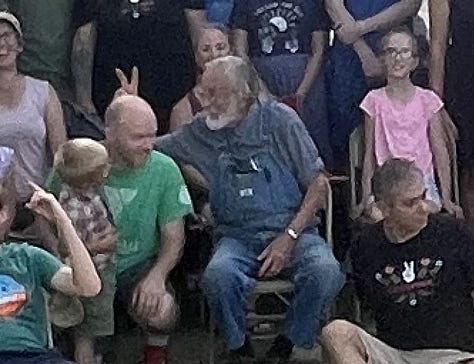
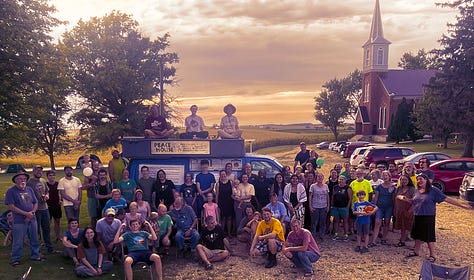
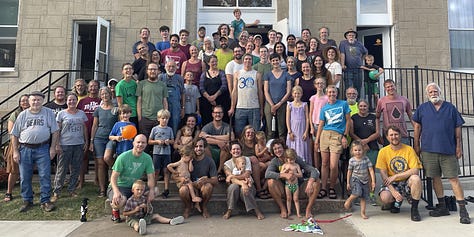
About 75 people gathered in Sugar Creek, Iowa, last weekend for the annual Midwest Catholic Worker Gathering, according to Eric Anglada (St. Isidore Catholic Worker Farm, Cuba City, Wisconsin). Roundtable topics included: “Grieving Processes,” “Community Song Circle,” “Mutual Aid,” "Crafting," “Where are we seeing God and hope in our lives and work?”, “Advice for Young Activists,” and “Attracting people to the Catholic Worker.” If you missed it, you can read about the history of the Midwest Catholic Worker Sugar Creek Gathering in an updated version of last week’s story on CatholicWorker.org.
Members of the Hartford Catholic Worker joined a protest in New London, Connecticut on Wednesday to decry General Dynamic’s nuclear submarine production. “The protest was to highlight General Dynamics' role in what they called the ongoing genocide in Palestine and to call for an economic shift from the military-industrial complex to life-affirming industries,” according to The Day. Read more.
The Rechabite Catholic Worker, in Lancaster, Penn., hosted a Roundtable Discussion entitled “Can women be ordained...to be deacons?” on Saturday, September 7, in honor of the feast of St. Phoebe, deaconess. Phoebe’s Day, on September 3, has become a feast day on which many women throughout the United States share their thoughts on the “diaconal” work they do serving the poor and marginalized in the Church and preaching the Gospel through words and actions. Sean Domencic, who organized the Roundtable Discussion said that the theology of the diaconate was a “big hole in my catechesis,” and that current dialogue around women in the diaconate brought the unique role of diaconal ministry to his attention. One of the readings the group discussed was an article by Catherine Brown Tkacz, the first woman to graduate with a doctorate in Medieval Studies from the University of Notre Dame and a member of the papal commission to study the question of women in the diaconate. You can read Tkacz’s article in The Deacon Magazine.
On Wednesday, September 11, the London Catholic Worker hosted a live performance of The Priest’s Tale. Playwright and actor Michael Mears adapted the story of Father Wilhelm, a Jesuit priest in Hiroshima, from journalist John Hersey’s account of the atomic bombings, Hiroshima. Mears gave a solo performance on Wednesday, according to Independent Catholic News. (See photos.)
Amistad Catholic Worker (Hartford, Conn.) has hired a lawyer to appeal the city’s decision to cut power to the six tiny homes in its backyard, according to a report by NBC CT. A hearing will be held on Tuesday. Watch the report here.
“When I was 19, I wanted to be (Dorothy Day),” singer/songwriter Brianna McGeehan tells Australian entertainment outlet The AU Review. “I tried to read all the same books she read, I went to Mass every Sunday. Dorothy Day was so cool—she lived in voluntary poverty, and she was all about community, and that’s how we heal.” The folk singer was interviewed by the magazine to promote her first single since 2020, “Home.” You can read the whole interview and listen to the song at The AU Review.
“When I heard Mr. Trump spewing lies about what is on others’ plates, it struck me as more than just a deranged accusation, because his words and accusations defile those Eucharistic moments we all use to connect and need to survive,” writes Tinamarie Stolz, formerly of the Oakland (California) Catholic Worker, in an essay for America magazine. Stolz recalls the many meals she has shared with others over the years, including those at the Oakland Catholic Worker. Read her essay at America.
40+ CW communities have already registered for the Catholic Worker National Gathering scheduled for Oct. 4-6 in Chicago, according to organizers at St. Francis House, who describe the response as “humbling.” People who are not associated with a community but who are interested in attending are welcome, too. While there is no official registration deadline, organizers say they will be finalizing food and other arrangements beginning Monday, Sept. 30. Find a tentative schedule and register at the St. Francis CW website.
The fiftieth anniversary of the St. Francis Catholic Worker (Chicago) was front and center in the latest Coffee with Catholic Workers podcast, in which hosts Theo and Lydia interviewed three current members of the Chicago-based Catholic Worker community: Danielle, Dan, and Quinn. The conversation focused on the history of the house, its role in providing hospitality, and the upcoming celebration marking five decades of service. Check out this and other recent episodes of the podcast at the Coffee with Catholic Workers YouTube page or wherever you stream podcasts. Roundtable will provide transcripts of these episodes in the coming months.
The Los Angeles Catholic Worker (LACW) interns Matthew, Luke, Meg, and Sean joined Rosie in Kentucky to discuss their reflections on the documentary *The Berrigans: Devout and Dangerous* in a YouTube interview. The film, which highlights the lives of Catholic peace activists Philip and Daniel Berrigan, along with Liz McAlister and Steve Kelly, SJ, left a profound impact on the group. Watch the short video here.
How did the IWW turn popular hymns into songs to fan the flames of discontent? The Industrial Workers of the World swiped songs from the Salvation Army and turned them into anthems promoting their cause, accrding to Ken Curtin. He led a roundtable at the New York Catholic Worker Maryhouse on September 13, complete with singing. Catch a snippet of one of those songs on the NYCY Instagram page.
CALENDAR
September 24 | St. Bakhita Catholic Worker, Milwaukee, Wisconsin
Contemplative Prayer to End Racism
October 4-6 | St. Francis Catholic Worker, Chicago, Illinois
Catholic Worker National Gathering
October 7 | Harrisburg Catholic Worker
Feast of Our Lady of the Rosary Vigil for Peace
October 9 - April 10 | St. Bakhita Catholic Worker, Milwaukee, Wisconsin
Dorothy Day: Patron Saint of Both/And
October 25 | Maryhouse, New York City
“Lead us towards those we are waiting for”: Flannery O’Connor’s Late Encounter with the Enemy
November 6 | Seton Hall University, South Orange, New Jersey
Dorothy Day: Servant of God and Modern-Day Prophet (with Martha Hennessy)
A FEW GOOD WORDS
“Social Missionaries” by Peter Maurin
A School of Social Studies
would be the training ground
for Social Missionaries,
priests, laymen and women.
As Al Smith said:
“The social problem
is not a problem
for politicians,
business men,
and lawyers.”
The social problem
is a problem
for Social Missionaries.
The task of Social Missionaries
is not to help people
to adjust themselves
to the existing environment.
The task of Social Missionaries
is to teach people
the difficult art
of creating order
out of chaos.
To be a Social Missionary
requires social-mindedness,
historical-mindedness
and practical idealism.
Roundtable covers the Catholic Worker Movement. This week’s Roundtable was produced by Jerry Windley-Daoust and Renée Roden. Monica Welch is off this week. Cover photo from Sugar Creek courtesy of the Marquette University Archives.
Roundtable is an independent publication not associated with the New York Catholic Worker or The Catholic Worker newspaper. Send inquiries to roundtable@catholicworker.org.


